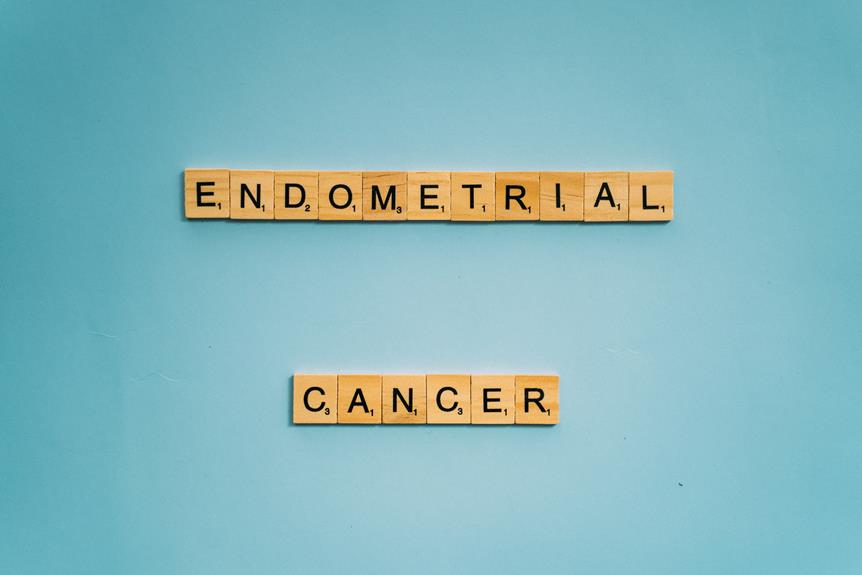What Is Endometrial Cancer and How to Spot the Signs

Did you know that endometrial cancer is the most common type of uterine cancer, affecting thousands of women each year? Recognizing the signs and symptoms of this disease is crucial for early detection and effective treatment.
In this article, we will explore the risk factors, symptoms, diagnostic tests, stages, treatment options, and preventive measures for endometrial cancer. By understanding the signs, you can empower yourself and others to take proactive steps towards better health and wellbeing.
Key Takeaways
- Obesity is a major risk factor for endometrial cancer due to its impact on hormonal imbalances and abnormal cell growth in the endometrium.
- Common symptoms of endometrial cancer include abnormal vaginal bleeding, pelvic pain, and unintentional weight loss.
- Regular pelvic exams and Pap tests are effective methods for early detection of endometrial cancer.
- Diagnostic tests such as transvaginal ultrasound and endometrial biopsy can confirm the presence of cancer cells and determine the type and grade of cancer.
Risk Factors for Endometrial Cancer
One of the key risk factors for endometrial cancer is obesity, which significantly increases the likelihood of developing the disease. Obesity is a condition characterized by excessive body fat accumulation, often resulting from an imbalance between energy intake and expenditure.
Endometrial cancer is the most common gynecological malignancy and is strongly associated with hormonal imbalances. Obesity can lead to hormonal imbalances by affecting the production and metabolism of hormones such as estrogen, which plays a crucial role in the development and growth of the endometrium.
Excess estrogen levels due to obesity can promote abnormal cell growth in the endometrium, leading to the development of cancerous cells. Therefore, addressing obesity is essential in reducing the risk of endometrial cancer and promoting overall health and well-being.
Common Symptoms of Endometrial Cancer
Several common symptoms of endometrial cancer include abnormal vaginal bleeding, pelvic pain, and unintentional weight loss. Early detection methods for endometrial cancer are crucial in improving treatment outcomes and overall prognosis.
Currently, the most effective method for early detection is through regular pelvic exams and Pap tests, which can help identify any abnormalities in the uterus lining. Additionally, transvaginal ultrasound and endometrial biopsy may be recommended if there are any concerns or suspicious symptoms.
Research advancements in endometrial cancer treatment have shown promising results. Targeted therapies, such as hormonal therapy and immunotherapy, have been developed to specifically target cancer cells and minimize damage to healthy cells. Furthermore, clinical trials are underway to test new treatment approaches, including combination therapies and precision medicine, which aim to personalize treatment based on the individual characteristics of each patient's cancer.
Diagnostic Tests for Endometrial Cancer
Both transvaginal ultrasound and endometrial biopsy are commonly used diagnostic tests for endometrial cancer. These tests are essential in detecting the presence of cancer cells in the lining of the uterus and determining the stage of the disease.
Here are four important points to consider regarding these diagnostic tests:
- Transvaginal ultrasound: This non-invasive procedure uses sound waves to create images of the uterus, ovaries, and surrounding tissues. It helps identify abnormal growths or thickening of the endometrium.
- Endometrial biopsy: This procedure involves removing a small sample of tissue from the lining of the uterus for microscopic analysis. It helps confirm the presence of cancer cells and determine the type and grade of the cancer.
- Screening guidelines: It is crucial to follow the recommended screening guidelines, which may include regular pelvic exams, transvaginal ultrasounds, and endometrial biopsies, especially for individuals at increased risk.
- Alternative therapies: While diagnostic tests are necessary for accurate diagnosis, some individuals may explore alternative therapies to complement medical treatments. It is important to discuss these options with healthcare professionals to ensure they are safe and effective.
Understanding the importance of diagnostic tests for endometrial cancer sets the stage for discussing the various stages and treatment options for this disease.
Stages and Treatment Options for Endometrial Cancer
During the early stages of endometrial cancer, treatment options such as surgery, radiation therapy, and hormone therapy are often recommended to effectively manage the disease.
The stages of endometrial cancer are determined based on the extent of the cancer's spread within the uterus and nearby tissues. In stage I, the cancer is confined to the uterus. In stage II, it has spread to the cervix. Stage III indicates the spread to the pelvic area and nearby lymph nodes, while stage IV signifies the cancer has metastasized to distant organs.
Surgical options for endometrial cancer include hysterectomy, which involves removing the uterus, and lymph node dissection to assess the spread of cancer. These procedures can help in the early detection and treatment of endometrial cancer, improving the chances of successful outcomes.
Preventive Measures and Early Detection of Endometrial Cancer
To effectively combat endometrial cancer, individuals should regularly undergo screenings and maintain a healthy lifestyle, as both personal responsibility and early detection are crucial in preventing the progression of this disease.
Prevention strategies and lifestyle modifications play a significant role in reducing the risk of endometrial cancer. Here are four key measures individuals can take:
- Maintain a healthy weight: Obesity is a major risk factor for endometrial cancer. By adopting a balanced diet and engaging in regular physical activity, individuals can manage their weight and decrease their chances of developing this cancer.
- Hormone therapy: Women who undergo hormone replacement therapy without progesterone are at a higher risk of endometrial cancer. Choosing the right hormone therapy, under the guidance of a healthcare professional, can help minimize this risk.
- Contraception: Using oral contraceptives for an extended period can reduce the risk of endometrial cancer. Discussing contraception options with a healthcare provider can help individuals make informed decisions.
- Regular screenings: Routine screenings, such as Pap tests and transvaginal ultrasounds, can detect early signs of endometrial cancer. Regular check-ups with a gynecologist are essential for early detection and timely intervention.
Frequently Asked Questions
Are There Any Alternative Treatments Available for Endometrial Cancer Besides Surgery and Radiation Therapy?
Alternative treatments for endometrial cancer, besides surgery and radiation therapy, include hormone therapy. This treatment involves the use of medications to block the effects of estrogen, which can help slow down the growth of cancer cells.
Can Endometrial Cancer Be Inherited From Family Members?
Endometrial cancer can be inherited from family members due to genetic risk factors. While surgery and radiation therapy are common treatment options, alternative treatments may also be available depending on individual circumstances.
Are There Any Lifestyle Changes That Can Reduce the Risk of Developing Endometrial Cancer?
Lifestyle modifications can play a crucial role in reducing the risk of developing endometrial cancer. Adopting a healthy diet, maintaining a healthy weight, regular physical activity, and avoiding exposure to estrogen-based medications can significantly lower the risk.
Can Endometrial Cancer Cause Infertility or Affect Fertility in Women?
Endometrial cancer can potentially impact fertility in women, although not all cases lead to infertility. Treatments for endometrial cancer, such as surgery or radiation therapy, may affect the reproductive organs and reduce the chances of conceiving.
Are There Any Specific Dietary Recommendations for Women at Risk of Endometrial Cancer?
Dietary recommendations for women at risk of endometrial cancer can include consuming a balanced diet rich in fruits, vegetables, whole grains, and lean proteins. Alternative treatments such as acupuncture and herbal supplements may also be considered.









